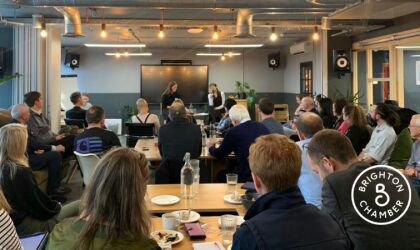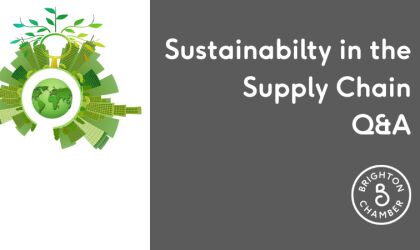
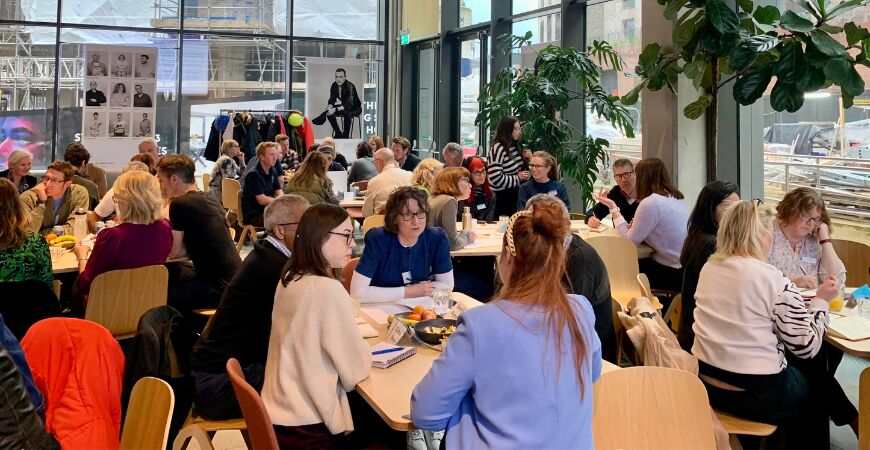
Fri 05 / 05 / 23
How the circular economy is taking shape in Brighton
Shova Thapa Karki recently revealed new research to our Net Zero Champions about how local businesses are engaging in the circular economy.
By Vicki Hughes of
Along with many of the city’s small business owners, several of our Net Zero Champions took part in a new research project from the University of Sussex to help build a framework in creating a more environmentally sustainable circular economy.
Senior Lecturer Shova Thapa Karki joined us to share the results, alongside case studies from Tiny Box Company, Axiom Architects and Event Cycle.
Here’s a snapshot of the research, its findings what we learned:
Shova and her team interviewed and surveyed Brighton & Hove-based businesses who are putting circular economy principles into action. As such, it was very practical research, collating the experiences of 80 founders and leaders of small to medium-sized businesses who are finding their own ways in creating a circular business. The results point to several barriers as well as strengths to be built on.
Why does circular flow of materials matter?
Shova said: “According to the Ellen MacArthur Foundation more than 45% of carbon reduction by 2050 needs to come from changing the way we make and use products, showing how much is riding on the need to move into a circular economy. Yet despite global traction, progress has been very limited.”
The share of materials recycled and fed back into the economy last year was only 8.6%, down from 9.3% in 2018. Meanwhile businesses are losing interest in circular flow or using the circular economy for greenwashing. There’s a gap in evidence when it comes to small and medium-sized business experiences, which is why Shova and her team did this research.
What did she find?
The research identified four main types of small business involved in the circular economy in Brighton & Hove:
- Those who’ve been operating in the circular economy for several years
- A few circular startups who are 100% circular in design and operations
- Charities who are enabling circular economy behaviours
- Existing businesses who are moving into circular ways of doing business
When asked what stage each business was at in their journey to circularity, Shova found that 28% had not yet taken any action, 61% were in the process and looking at systems and processes to implement, whilst just 11% were already implementing circular actions.
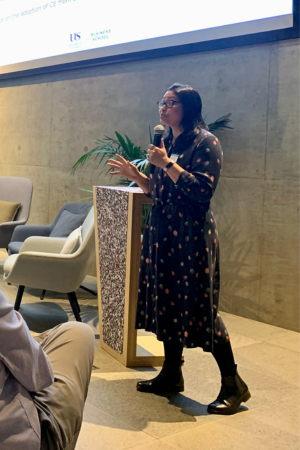
The research also found that existing businesses that are becoming more circular are mostly doing so because of costs and client demands. “It’s a business case,” said Shova. “Most are focused on restoration, waste management, and reducing risk.”
Yet many existing companies trying to build their circular business model reported feeling disheartened, saying “they feel they are losing the battle” in creating a circular business. The problem was broadly felt to come down to only a fairly small proportion of customers actively seeking to buy from circular businesses and a lack of policy support. The challenge is how to reach out to larger customer groups and make circular products and services business as usual.
Interestingly, many circular startups have been built from collaborations. Other businesses were already on board with the idea behind the startup, or they were created with a specific partnership in mind. As Shova said: “While circular businesses have many challenges, one thing they are doing very well is working with peers and building relationships.”
Circular businesses were also found to have strong social, as well as environmental, impact. Supporting their communities and other local businesses is central to how they operate.
What’s needed to push more circular businesses forward?
“We are seeing a lot of soft support, like training courses, signposting and networking events,” said Shova, “but there’s a real lack of initiatives to foster collaboration.”
“We also need better policies. At the moment, a business using recycled material will be taxed at the same rate as one using plastic.” There is a need of policies to level the playing-field.
She stressed the importance of: “Networks and network organisations that bring circular businesses together, but also share best practices.”
And while knowledge is improving, she found: “There are still gaps in what the circular economy means for specific businesses. There’s also a level of confusion about where circular fits when people are being bombarded with net zero environmental standards. Expert guidance is needed.”
The research found that businesses engaging in the circular economy want peer support, but they also want recognition: “Support from local authorities, whatever they can get.” As Shova put it: “Incentives and cost reductions are essential because survival is a serious issue here.”
Quoting a recent paper from the Netherlands, Shova concluded by saying that networking organisations and partnerships are leading the transition to a circular economy overseas. “Stakeholders need to create opportunities for businesses to collaborate.”
Next, we heard from three local businesses who shared their experiences in creating a circular business:
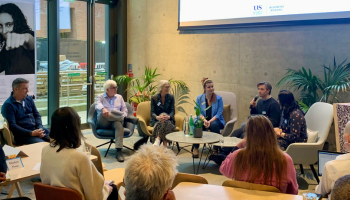
“As architects and interior designers we’re broadly defined as a consultancy, so in some ways our impact might look small, but when you design stuff you design a lot of it, so we can have quite a large impact. We mostly work with large clients in hospitality and commercial, student housing and residential projects.”
On the findings:
“I can identify with a lot of this. There’s a lot of information out there. Almost too much. The key is finding the right information. And I agree networking is key.”
And the key to implementing circular principles?
“It starts with getting buy-in. We’ve been working on lowering our carbon footprint for four or five years and I’ve learned a lot from how we got everyone on board. You have to change habits as quickly as possible, so I think educating staff really matters.
“When you get it right it’s sort of contagious. Thinking starts to change - how can I care for this a bit more, how can I take it slower, how can I shrink? Because we work on such big projects, the circles are very large, almost so that you can’t see them, so it’s a case of trying to work at city level.”
“We support event businesses to find practical solutions to sustainability challenges, looking at things like material choices from the get go, but right up to asset dissolution. So if there are things leftover from events we repurpose them for charities, community groups and social enterprises.”
On the findings:
“We tried for funding when we started and were told sorry, no, if you don’t have enough stats you can’t get anything. But nobody had taken those steps so there were no stats, so how were we supposed to put stats into a business plan? So I think research like this is useful to see where we’re at in the process towards circularity and to see that journey ahead.”
And the key to implementing circular principles?
“For us it’s the community element, starting with what clients are asking, for example how can we make our materials sustainable? I often ask clients their biggest pet peeve when creating waste and we work at fixing that problem, which often means going back to the community in some way.
“We’re working with so many social enterprises now and doing research into things like how a waste material can be melted down into a 3D printer cartridge so something else can be made from it. It’s about finding out the different players from all these communities and how to work together as we all have the same goal.”
“Back in 2007 I was looking for packaging for a jewellery business and couldn’t find anything except mass-produced Chinese plastic, so I ended up doing it myself. I went on Dragon’s Den a year later and was told sustainable packaging would never be mainstream. We now have 100 employees and are determined to work with the community and try to be as circular as possible.”
On the findings:
“A lot of this doesn’t surprise me. The Government has a whole 'export champions scheme', surely they could fund a scheme for circular? We need better idea-sharing of what’s worked, like how to link up local businesses with particular types of waste, to those that need a programme like this.”
And the key to implementing circular principles?
“It’s like Luke was saying about staff, and how more circularity at work goes on to impact how their families behave - it’s that butterfly effect. Then it’s also getting customers excited about circular practices, and it translates to their families.
“We’re pleased that this perception has been slowly changing about the business case to move into sustainable and circular models - we’re in a whole new place now.”
So what did the room of NetZero champions think?
Here are some of their comments following group discussions, much of it focusing on the need for better collaboration and knowledge sharing:
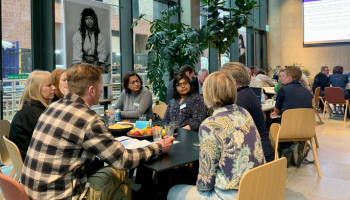
Harriet Dean-Orange, Harriet’s of Hove
“The one thing that we all agreed on is that collaboration is key. We also felt there’s a real need to help people before they’ve started their business, those businesses not yet born. Sometimes it's difficult to change, but if you can speak to people before they've started their business and help them set up circular practice from the start and support them in a friendly environment, that can have a huge impact.”
Anne-Fay Townsend, University of Sussex
“We talked about where does a small business start? How do we start? Is it an audit of suppliers and behaviours and products and looking at where the circular opportunities are within that, but also other circular challenges”.
Marcus Atkinson, University of Sussex
“We were thinking of a way to facilitate that kind of buddy system with established businesses and start-ups to help meet the need to network and generate energy.”
Thomas Wolfenden, University of Sussex
“There are plenty of bad ideas around the circular economy. And often they come from people who have never run a business. So it’s important to create a business network to critique business models and ideas.”
Annabel Dunstan, Question & Retain
“Taking small steps can sometimes feel overwhelming, but we all agreed that taking small steps can create the biggest change.”
Toby Buckle, The Healthy Leadership Partnership
“How do you get the word out? There’s so much stuff happening, how do you know about it, how do you find out what's going on? People also want facts - how do we make sure that people can use the right facts when there's so much greenwashing.”
Dougal Fleming, University of Brighton
“Education is a key theme. How do we talk about the circular economy, communicate it, promote it and help people understand the glossary of terms that surround it. People can feel lost because they don't know some of the terminology, so it’s important to help demystify some of that.”
Sarah Springford, Brighton Chamber
“We talked about how different industries can help each other and share lessons in circularity.”
What next?
With Steve Creed from Circular Brighton and Hove, Shova is developing a self-assessment tool to help small to medium-sized businesses move through the different stages of circularity. To ensure that tool fits the needs of businesses, local companies are invited to a workshop on 12 May from 3-5pm at the Business & IP Centre, Brighton and Hove (in Jubilee Library) to help shape and co-create that tool. If you would like to attend or to share your thoughts, please email Shova (s.thapa-karki@sussex.ac.uk) or Steve (steve@sustainabilitycoach.co.uk). You can find more details about the event here.
Shova also hopes this research and tool will help spark new local networks of those pursuing circular economy models.
Furthermore, The University of Sussex is one of many partners working with us, the Chamber, Brighton & Hove City Council and circular business leaders on a new project to share circular business success stories. We’ll be announcing a follow up event on that soon, so stay tuned or register here to join the Net Zero Champions.
Vicki Hughes is founder and MD at Fugu PR, the public relations and communications consultancy.
Our Net Zero Champions are the people in business who are driving the journey to Net Zero.
If you want to contribute to the Chamber blog, contact us on hannah@brightonchamber.co.uk



